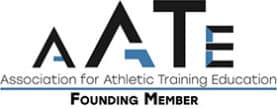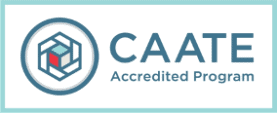| COURSE NUMBER | COURSE NAME | DEPARTMENT | CREDIT HOURS | YEAR | COURSE DESCRIPTION |
| MSAT 525 | Clinical Anatomy Lab | Athletic Training | 3 | Post-Graduate | This course will provide information related to the kinematics and kinetics of human locomotion through the study of functional, orthopedic anatomy. The goal of the course is for each student to be able to identify musculoskeletal, articular, nervous, and vascular systems of the human body and to understand the functional contribution of such structures to pathologies related to physical activity. Prereq: Admittance to the MSAT. Summer. |
| MSAT 527 | Prevention of Injuries and Med Conditions | Athletic Training | 3 | Post-Graduate | Students will develop strategies and programs to prevent the incidence and/or severity of injuries and illnesses while optimizing patient overall health. Emphasis is placed on the prevention of injuries to physically active individuals in the areas of conditioning, pre-participation screening, nutritional concepts, and environmental risk factors. The appropriate use of and fit for protective equipment, and proper application of wrapping, taping, braces and orthotic devices will be practiced. Laboratory experiences are used to supplement classroom instruction. Prerequisite: Admittance to the MSAT. Summer. |
| MSAT 529 | Acute Care of Injuries and Illness | Athletic Training | 4 | Post-Graduate | Development of knowledge and skills in the evaluation and immediate management of acute injuries and illnesses. Focus is on planning for, examining, and managing immediate, emergent and acute situations particularly for physically active individuals. Immobilization, splinting, transporting, wrapping and taping techniques for managing acute injuries will be practiced. Additionally, students will demonstrate emergency care skill consistent with National Athletic Trainers? Association position statements. Laboratory experiences are used to supplement classroom instruction. Prerequisite: Admittance to the MSAT. Fall. |
| MSAT 530 | Clinical Examination and Diagnosis: Lower Extremity | Athletic Training | 4 | Post-Graduate | Instruction on assessment procedures and evaluation techniques for lumbar and lower extremity injuries. It includes an in-depth inquiry into the anatomical and physiological effects associated with the occurrence of injuries to physically active individuals and the process and components of an injury evaluation. Students learn to perform and interpret the results of structural and functional tests in order to accurately diagnose injury and determine appropriate differential diagnoses. Students will develop clinical decision making skills through the integration of evidence-based medicine. Clinical outcomes assessment including patient self-report measures will be an integral part of this course. Prerequisites: MSAT 525 and MSAT 527. Fall. |
| MSAT 531 | Clinical Examination and Diagnosis: Upper Extremity | Athletic Training | 4 | Post-Graduate | Assessment procedures and evaluation techniques for abdominal, thoracic, and upper extremity injuries. It includes an in-depth inquiry into the anatomical and physiological effects associated with the occurrence of injuries to physically active individuals, and the process and components of an injury evaluation. Students learn to perform and interpret the results of structural and functional tests in order to accurately diagnose injury and determine appropriate differential diagnoses. Students will develop clinical decision making skills through the integration of evidence-based medicine. Clinical outcomes assessment including patient self-report measures will be an integral component of this course. Prerequisites: MSAT 525 and 527. Spring. |
| MSAT 534 | Concepts in Therapeutic Interventions I | Athletic Training | 4 | Post-Graduate | This integrated course focuses on theory, principles, physiological effects, and application of various therapeutic interventions designed to maximize patient?s participation and health-related quality of life. The indications, contraindications, and operational protocols for common therapeutic interventions and pharmacological agents to manage pain, control inflammation, and restore function will be studied. Emphasis will be placed on the use of evidence-based practice to develop therapeutic goals and establish appropriate use of progression, treatment effectiveness, assessment of patient satisfaction, and ability to return to physical activity. Laboratory experiences will be used to supplement classroom instructions. Prerequisite: MSAT 530 or 531. Spring. |
| MSAT 543 | Research Methods and Evidence Based Practice | Athletic Training | 3 | Post-Graduate | The fundamentals of evidence-based medicine with specific focus toward understanding various levels of research and reading comprehension of research articles will be emphasized. A working knowledge of the research process and interpretation of findings will also be a focus whereby students begin work on research projects including identifying a problem, conducting a literature review, developing a hypothesis, and forming initial research design. Prerequisite: Admittance to MSAT. Fall. |
| MSAT 544 | Directed Research Studies and Analysis | Athletic Training | 3 | Post-Graduate | Students will gain experience with the hands-on component of the research process, and statistical analysis of data. Working with a faculty advisor, students will develop skill implementing their research proposal and continue the research process through data collection and analysis. Students will study statistical procedures commonly used in descriptive and experimental research in athletic training. Basic statistical analysis will be reviewed and advanced statistics in relation to individual research projects will be discussed. Prerequisite: MSAT 543. Spring. |
| MSAT 550 | Clinical Exper in Athletic Training I | Athletic Training | 1.5 | Post-Graduate | A clinical course in which students complete supervised experiences in a variety of health care settings under the guidance of preceptors. Clinical experience hours will be augmented with a seminar on basic practices necessary to a successful athletic trainer. Students are responsible for costs associated with travel to and from their clinical experiences. Prerequisite: Admittance to the MSAT. Summer. $30 course fee for CPR for the Professional Rescuer recertification. |
| MSAT 551 | Clinical Exper in Athletic Training II | Athletic Training | 3.5 | Post-Graduate | A clinical course in which students rotate through supervised experiences in a variety of athletic training and health care settings under the guidance of preceptors. Students begin the process of integrating knowledge, skills, and clinical decision-making into actual client/patient care while utilizing evidence-based medicine to solve clinical problems. A demonstration of proficiency in skills up to and including prevention and care of athletic injuries is required. Clinical experience hours will be augmented with a seminar on basic practices necessary to become a successful athletic trainer. Students are responsible for costs associated with travel to and from their clinical experiences. Prerequisite: MSAT 550. Fall. |
| MSAT 552 | Clinical Exper in Athletic Training III | Athletic Training | 1.5 | Post-Graduate | A clinical course in which students complete supervised experiences in a variety of health care settings under the guidance of preceptors. Clinical experience hours will be augmented with a seminar on practices necessary to a successful athletic trainer. Students are responsible for costs associated with travel to and from their clinical experiences. Prerequisite: MSAT 550. Winter. |
| MSAT 553 | Clinical Exper in Athletic Training IV | Athletic Training | 3.5 | Post-Graduate | A clinical course designed to provide experience under the direct supervi?sion of a preceptor. A demonstration of proficiency in skills up to and including prevention and care of athletic injuries and clinical exam and diagnosis of injuries is required. The incorporation of evidence-based practice principles will be emphasized. Further foundational behaviors in the context of real patient care will be assessed. Clinical experience hours will be augmented with a seminar on methods to enhance clinical skills. Students are responsible for costs associated with travel to and from their clinical experiences. Prerequisite: MSAT 550. Spring. |
| MSAT 600 | Immersive Clinical Experience in AT | Athletic Training | 2 | Post-Graduate | An immersive clinical experience, under the direct supervision of a preceptor, that provides a practice-intensive experience to allow students to experience the totality of care provided by athletic trainers. Students must participate in the day-to-day and week-to-week role of an athletic trainer for a four-week period. Prerequisite: MSAT 553. Summer. |
| MSAT 610 | Internship in Athletic Training I | Athletic Training | 0 | Post-Graduate | A clinical course which provides students an opportunity to gain experience under the direct supervision of a preceptor at a pre-approved off-campus site. This will be an individualized experience, allowing a student to pursue specific learning goals. Prerequisite: MSAT 551 or MSAT 553. Summer. |
| MSAT 620 | Internship in Athletic Training II | Athletic Training | 0 | Post-Graduate | A clinical course that provides students an opportunity to gain experience under the direct supervision of a preceptor at a pre-approved clinical site. This will be an individualized experience, allowing a student to pursue specific learning goals. Prerequisite: Program Director approval. Winter. |
| MSAT 625 | Healthcare Administration | Athletic Training | 2 | Post-Graduate | Exploration of organizational and administrative aspects of athletic health care management for various employment settings. Emphasis is placed on students developing an understanding of human resources, risk management, healthcare delivery mechanisms, insurance, reimbursement, documentation, patient privacy, and facility management. Prerequisite: Second-year status in MSAT. Spring. |
| MSAT 631 | Clinical Pathology and Medical Interventions | Athletic Training | 4 | Post-Graduate | This is an advanced course for athletic training students as they build a foundational understanding of disease, disorders, illness and other general medical conditions affecting the health of physically active people across the lifespan. Students learn to recognize signs, symptoms and predisposing factors of pathology along with appropriate interventions for treating medical conditions. Additionally, students gain skill in analysis of evidence in relation to patient care while performing standard techniques and procedures for clinical examination and establishing appropriate referral. Laboratory experiences will be used to supplement classroom instructions. Prerequisites: MSAT 530 and MSAT 531. Fall. |
| MSAT 634 | Concepts in Therapeutic Interventions II | Athletic Training | 4 | Post-Graduate | Content will build upon concepts of therapeutic interventions established in MSAT 534. Students will develop an integrated approach to the treatment of injuries. Focus will be on the indications, contraindications, and operational protocols for therapeutic interventions relative to progressing through healing and restoring normal function and a highly competitive state for physically active individuals. Treatment effectiveness, patient satisfaction, and critical assessment of evidence in relation to patient care will be emphasized. Laboratory experiences will be used to supplement classroom instructions. Prerequisite: MSAT 534. Fall. |
| MSAT 635 | Psychosocial Strategies and Referral | Athletic Training | 3 | Post-Graduate | Preparation in the ability to recognize patients who are exhibiting unhealthy social, emotional, and/or mental behaviors of the physically active population will occur. Students will develop an advanced approach, including in-depth application of psychosocial interventions, to working with injured or impaired active individuals. Emphasis is placed on recognition, intervention, and appropriate referral. Prerequisite: MSAT 634. Spring. |
| MSAT 637 | Professional Prep in Athletic Training | Athletic Training | 2 | Post-Graduate | A focus on advanced concepts in professional development. Students complete a self-assessment and construct a plan for continued professional development. Preparation for the Board of Certification exam is emphasized. Strategies related to enhancing leadership skills and the promotion of athletic training will be explored. Taken semester of or just prior to graduation. Prerequisite: Semester of or just prior to graduation. Winter. |
| MSAT 638 | Advanced Concepts in Athletic Training | Athletic Training | 2 | Post-Graduate | An advanced course that allows for examination of in-depth functional movement patterns and advanced athletic training techniques. Practical application of current concepts and evidence-based medicine are emphasized. The course also addresses concepts in mental health concerns and crisis management. Prerequisite: MSAT 634. Spring. Fee: $150 nonrefundable. |
| MSAT 643 | Research Seminar | Athletic Training | 1 | Post-Graduate | Students will complete a written manuscript and poster in preparation for presentation. Oral presentations may occur both on and off campus to peers and professionals. Emphasis is placed on written and oral communication skills. Prerequisite: MSAT 544. Fall |
| MSAT 650 | Clinical Exper in Athletic Training V | Athletic Training | 4.5 | Post-Graduate | Advanced clinical experience where students are responsible for assisting in the healthcare of patients during practices, games, treatments, and rehabilitation under the direct supervision of a preceptor. Demonstration of proficiency in skills up to and including clinical exam and diagnosis of injuries and basic therapeutic interventions is required. The incorporation of evidence-based practice principles including critical assessment of patient self-report measures will be emphasized. Further, foundational behaviors in the context of real patient care will be assessed. Clinical experience hours will be augmented with a seminar on methods to enhance clinical skills. Students are responsible for costs associated with travel to and from their clinical experiences. Prerequisite: MSAT 550. Fall. |
| MSAT 651 | Clinical Exper in Athletic Training VI | Athletic Training | 4.5 | Post-Graduate | Advanced clinical experience where students are assisting in the healthcare of patients during practices, games, treatments, and rehabilitation under the direct supervision of a preceptor. Students are required to integrate knowledge, skills, and clinical decision-making into actual client and patient care. Further foundational behaviors in the context of real patient care will be assessed. This clinical experience will also include an immersive component that allows the students to experience the totality of care provided by athletic trainers. During the immersive component, students will participate in the day-to-day and week-to-week role of an athletic trainer for a four-week period. Students are responsible for costs associated with travel to and from their clinical experiences. Prerequisite: MSAT 550. Spring. |
r. 12-20-21


